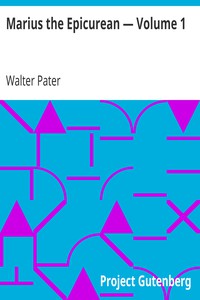Marius the Epicurean — Volume 1, Walter Pater [digital ebook reader .TXT] 📗

- Author: Walter Pater
Book online «Marius the Epicurean — Volume 1, Walter Pater [digital ebook reader .TXT] 📗». Author Walter Pater
During his sojourn at Ephesus, Lucius Verus had readily become a patron, patron or protégé, of the great goddess of Ephesus, the goddess of hunters; and the show, celebrated by way of a compliment to him to-day, was to present some incidents of her story, where she figures almost as the genius of madness, in animals, or in the humanity which comes in contact with them. The entertainment would have an element of old Greek revival in it, welcome to the taste of a learned and Hellenising society; and, as Lucius Verus was in some sense a lover of animals, was to be a display of animals mainly. There would be real wild and domestic creatures, all of rare species; and a real slaughter. On so happy an occasion, it was hoped, the elder emperor might even concede a point, and a living criminal fall into the jaws of the wild beasts. And the spectacle was, certainly, to end in the destruction, by one mighty shower of arrows, of a hundred lions, “nobly” provided by Aurelius himself for the amusement of his people.—Tam magnanimus fuit!
The arena, decked and in order for the first scene, looked delightfully fresh, re-inforcing on the spirits of the audience the actual freshness of the morning, which at this season still brought the dew. Along the subterranean ways that led up to it, the sound of an advancing chorus was heard at last, chanting the words of a sacred song, or hymn to Diana; for the spectacle of the amphitheatre was, after all, a religious occasion. To its grim acts of blood-shedding a kind of sacrificial character still belonged in the view of certain religious casuists, tending conveniently to soothe the humane sensibilities of so pious an emperor as Aurelius, who, in his fraternal complacency, had consented to preside over the shows.
Artemis or Diana, as she may be understood in the actual development of her worship, was, indeed, the symbolical expression of two allied yet contrasted elements of human temper and experience—man’s amity, and also his enmity, towards the wild creatures, when they were still, in a certain sense, his brothers. She is the complete, and therefore highly complex, representative of a state, in which man was still much occupied with animals, not as his flock, or as his servants after the pastoral relationship of our later, orderly world, but rather as his equals, on friendly terms or the reverse,—a state full of primeval sympathies and antipathies, of rivalries and common wants—while he watched, and could enter into, the humours of those “younger brothers,” with an intimacy, the “survivals” of which in a later age seem often to have had a kind of madness about them. Diana represents alike the bright and the dark side of such relationship. But the humanities of that relationship were all forgotten to-day in the excitement of a show, in which mere cruelty to animals, their useless suffering and death, formed the main point of interest. People watched their destruction, batch after batch, in a not particularly inventive fashion; though it was expected that the animals themselves, as living creatures are apt to do when hard put to it, would become inventive, and make up, by the fantastic accidents of their agony, for the deficiencies of an age fallen behind in this matter of manly amusement. It was as a Deity of Slaughter—the Taurian goddess who demands the sacrifice of the shipwrecked sailors thrown on her coasts—the cruel, moonstruck huntress, who brings not only sudden death, but rabies, among the wild creatures that Diana was to be presented, in the person of a famous courtesan. The aim at an actual theatrical illusion, after the first introductory scene, was frankly surrendered to the display of the animals, artificially stimulated and maddened to attack each other. And as Diana was also a special protectress of new-born creatures, there would be a certain curious interest in the dexterously contrived escape of the young from their mother’s torn bosoms; as many pregnant animals as possible being carefully selected for the purpose.
The time had been, and was to come again, when the pleasures of the amphitheatre centered in a similar practical joking upon human beings. What more ingenious diversion had stage manager ever contrived than that incident, itself a practical epigram never to be forgottten, when a criminal, who, like slaves and animals, had no rights, was compelled to present the part of Icarus; and, the wings failing him in due course, had fallen into a pack of hungry bears? For the long shows of the amphitheatre were, so to speak, the novel-reading of that age—a current help provided for sluggish imaginations, in regard, for instance, to grisly accidents, such as might happen to one’s self; but with every facility for comfortable inspection. Scaevola might watch his own hand, consuming, crackling, in the fire, in the person of a culprit, willing to redeem his life by an act so delightful to the eyes, the very ears, of a curious public. If the part of Marsyas was called for, there was a criminal condemned to lose his skin. It might be almost edifying to study minutely the expression of his face, while the assistants corded and pegged him to the bench, cunningly; the servant of the law waiting by, who, after one short cut with his knife, would slip the man’s leg from his skin, as neatly as if it were a stocking—a finesse in providing the due amount of suffering for wrong-doers only brought to its height in Nero’s living bonfires. But then, by making his suffering ridiculous, you enlist against the sufferer, some real, and all would-be manliness, and do much to stifle any false sentiment of compassion. The philosophic emperor, having no great taste for sport, and asserting here a personal scruple, had greatly changed all that; had provided that nets should be spread under the dancers on the tight-rope, and buttons for the swords of the gladiators. But the gladiators were still there. Their bloody contests had, under the form of a popular amusement, the efficacy of a human sacrifice; as, indeed, the whole system of the public shows was understood to possess a religious import. Just at this point, certainly, the judgment of Lucretius on pagan religion is without reproach—
Tantum religio potuit suadere malorum.
And Marius, weary and indignant, feeling isolated in the great slaughter-house, could not but observe that, in his habitual complaisance to Lucius Verus, who, with loud shouts of applause from time to time, lounged beside him, Aurelius had sat impassibly through all the hours Marius himself had remained there. For the most part indeed, the emperor had actually averted his eyes from the show, reading, or writing on matters of public business, but had seemed, after all, indifferent. He was revolving, perhaps, that old Stoic paradox of the Imperceptibility of pain; which might serve as an excuse, should those savage popular humours ever again turn against men and women. Marius remembered well his very attitude and expression on this day, when, a few years later, certain things came to pass in Gaul, under his full authority; and that attitude and expression defined already, even thus early in their so friendly intercourse, and though he was still full of gratitude for his interest, a permanent point of difference between the emperor and himself—between himself, with all the convictions of his life taking centre to-day in his merciful, angry heart, and Aurelius, as representing all the light, all the apprehensive power there might be in pagan intellect. There was something in a tolerance such as this, in the bare fact that he could sit patiently through a scene like this, which seemed to Marius to mark Aurelius as his inferior now and for ever on the question of righteousness; to set them on opposite sides, in some great conflict, of which that difference was but a single presentment. Due, in whatever proportions, to the abstract principles he had formulated for himself, or in spite of them, there was the loyal conscience within him, deciding, judging himself and every one else, with a wonderful sort of authority:—You ought, methinks, to be something quite different from what you are; here! and here! Surely Aurelius must be lacking in that decisive conscience at first sight, of the intimations of which Marius could entertain no doubt—which he looked for in others. He at least, the humble follower of the bodily eye, was aware of a crisis in life, in this brief, obscure existence, a fierce opposition of real good and real evil around him, the issues of which he must by no means compromise or confuse; of the antagonisms of which the “wise” Marcus Aurelius was unaware.
That long chapter of the cruelty of the Roman public shows may, perhaps, leave with the children of the modern world a feeling of self-complacency. Yet it might seem well to ask ourselves—it is always well to do so, when we read of the slave-trade, for instance, or of great religious persecutions on this side or on that, or of anything else which raises in us the question, “Is thy servant a dog, that he should do this thing?”—not merely, what germs of feeling we may entertain which, under fitting circumstances, would induce us to the like; but, even more practically, what thoughts, what sort of considerations, may be actually present to our minds such as might have furnished us, living in another age, and in the midst of those legal crimes, with plausible excuses for them: each age in turn, perhaps, having its own peculiar point of blindness, with its consequent peculiar sin—the touch-stone of an unfailing conscience in the select few.
Those cruel amusements were, certainly, the sin of blindness, of deadness and stupidity, in the age of Marius; and his light had not failed him regarding it. Yes! what was needed was the heart that would make it impossible to witness all this; and the future would be with the forces that could beget a heart like that. His chosen philosophy had said,—Trust the eye: Strive to be right always in regard to the concrete experience: Beware of falsifying your impressions. And its sanction had at least been effective here, in protesting—“This, and this, is what you may not look upon!” Surely evil was a real thing, and the wise man wanting in the sense of it, where, not to have been, by instinctive election, on the right side, was to have failed in life.
END OF VOL. I





Comments (0)